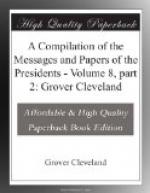CHESTER A. ARTHUR.
EXECUTIVE MANSION, Washington, February 13, 1884.
To the Senate of the United States:
In reply to the resolution of the Senate of the 11th instant, I have the honor to inclose a communication[16] from the Secretary of State.
CHESTER A. ARTHUR.
[Footnote 16: Relating to the demand of Mexico for the extradition of Alexander Trimble.]
EXECUTIVE MANSION, February 18, 1884.
To the Senate and House of Representatives:
I transmit herewith the report of a board of Army and Navy officers appointed by me in accordance with the act of Congress approved March 3, 1883, “for the purpose of examining and reporting to Congress which of the navy-yards or arsenals owned by the Government has the best location and is best adapted for the establishment of a Government foundry, or what other method, if any, should be adopted for the manufacture of heavy ordnance adapted to modern warfare, for the use of the Army and Navy of the United States, the cost of all buildings, tools, and implements necessary to be used in the manufacture thereof, including the cost of a steam hammer or apparatus of sufficient size for the manufacture of the heaviest guns.”
CHESTER A. ARTHUR.
EXECUTIVE MANSION, February 21, 1884.
To the Senate and House of Representatives:
I transmit herewith a report of the Secretary of State of the 21st instant, whereby your honorable body, and through you the people of the United States, may become apprised of the generous contribution made by Her Britannic Majesty’s Government toward the efforts for the relief of Lieutenant Greely’s arctic exploring party by presenting to the United States the arctic steamship Alert.
CHESTER A. ARTHUR.
DEPARTMENT OF STATE, Washington, February 21, 1884.
The PRESIDENT:
In the search for vessels suitable for the expedition now preparing to relieve Lieutenant Greely and his party, attention was early directed to the Alert, which is the property of the British Government, and was the advance ship of the expedition under Sir George Nares. It was desirable to secure this vessel, as she is peculiarly fitted for the intended service, and as the inspecting officers recommended her Mr. Lowell was therefore instructed to ask whether she could be spared for the service.
Information of the wish of this Government having previously and informally reached the British admiralty, a private intimation was conveyed to the United States minister to the effect that the British Government had not forgotten the very considerate conduct of this Government on the occasion of the recovery of the Resolute, and that should any suggestion be made that the vessel would be of use to the expedition she would be presented. The Resolute, a vessel, as the President remembers,




